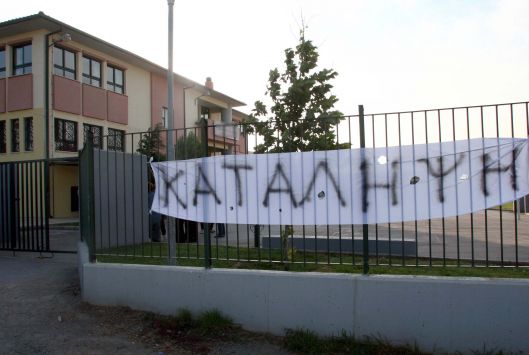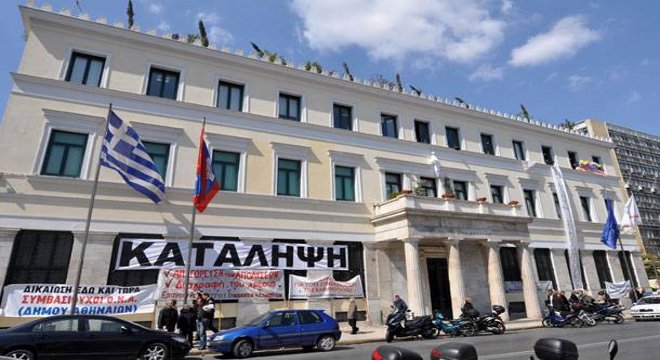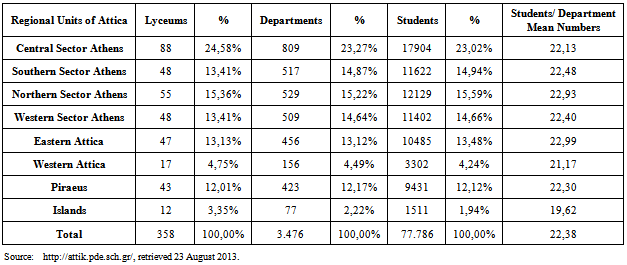-
Paper Information
- Previous Paper
- Paper Submission
-
Journal Information
- About This Journal
- Editorial Board
- Current Issue
- Archive
- Author Guidelines
- Contact Us
Management
p-ISSN: 2162-9374 e-ISSN: 2162-8416
2013; 3(7A): 29-37
doi:10.5923/s.mm.201310.05
Aspects of Greek Public Administration: Management of Secondary Schools
Stylianos A. Papazis1, 2, Maria G. Ioannides2
1Technological Vocational High School, Aharnes, 13671, Attica, Greece
2National Technical University of Athens, 15773, Athens, Greece
Correspondence to: Maria G. Ioannides, National Technical University of Athens, 15773, Athens, Greece.
| Email: |  |
Copyright © 2012 Scientific & Academic Publishing. All Rights Reserved.
This paper presents the recent situation, the problems, the causes and the proposed remedies for the management of secondary schools, at Greek national level. From the studies of existing management of secondary and vocational schools, from the collected materials and study cases, appears that the problems begin within the general public administration situation. Then, is the problematic system of appointing managers of schools, and the impact of wrong managerial decisions. The conclusions and recommendations are: the management of secondary schools is far from perfect; in fact the management of secondary schools needs redesign of some procedures, other partly with corrective additions or measures, some other procedures needs a total business process reengineering, from the beginning to the end. And this reform of secondary schools must be in the frame of public administration structural changes.
Keywords: Management of Secondary Schools, Greek Public Administration, Framework for Appointment of Managers, Teaching Staff of Secondary Schools
Cite this paper: Stylianos A. Papazis, Maria G. Ioannides, Aspects of Greek Public Administration: Management of Secondary Schools, Management, Vol. 3 No. 7A, 2013, pp. 29-37. doi: 10.5923/s.mm.201310.05.
Article Outline
1. General Considerations of Greek Public Administration
- The General Inspector of Public Administration, in the Annual Reports of years 2010-12, shows some degrees of misconduct that prevails in many Structural Units of the Greek Public Administration,[1-4]. Specifically, the majority of procedures of Public Economic Services are characterized as “problematic”. According to the Report[2], highly positioned in the scale of misconducts are the Urban Planning Offices and the Services of Public Health. Additionally, is the mentality of citizens which, in similar situations, do not equally apply the existing legislation? Characteristic example of urban arbitrariness: an afterwards additional arbitrary building, at the initially built house, that occupies part of the public municipal pavement (Photo 1). Same situation is encountered in the Annual Report of 2011,[3]. Most cases of misconduct concerned the economic management, without punishment for many of accountants-employees of state. According to[3], Urban Planning Offices, Inland Revenues and the Actuarial Funds remain in the first line of corruptness in Greece.A NGO named Transparency International Greece reports the topic of “micro-corruption” in Greece in 2011, which is also high, subject that concerns transactions between citizens and public sector employees,[5]. Related is also the conclusion of the report[5]: “Crisis of debt that infected Greece constitutes many decades of wastefulness, mismanagement and structural distortions”. Political and Administration system was suffering, and still does, from “clientism-cliental relations”, or corruption, or mis-management,[5-6].
 | Photo 1. Private House in Northern Attica built in excess of permitted urban rules |
2. The Issue of Legislation
- Isocrates, the ancient Greek philosopher, had said that “many laws are a sample of misconduct”. In Greece, which never suffered from lack of laws, but from their application, there are in force above 70.000 statutes. This ocean of provisions encourages bad administration and paralyzes mechanisms of coordination and control. Laws are established in order to cover ambiguities of previous provisions and raise the created uncertainty by other regulations, or to correct existent regulations. Regulations on regulations are added for different reasons. Many times, the new regulations are placed in irrelevant laws. With interventions and many irrelevant additions, a simple law is so malformed, that it ends up complicated to some people, difficult to use and sometimes harmful for other people. Then, new clarifications and directions for application are needed, which are written in later legal texts, and so far. Thus, laws are established in order to cover ambiguities of previous provisions, or to raise the uncertainty created by the regulations on regulations, or to harmonize the legislation with that of European Union, or to modernize the existing, but, also, to accommodate certain situations. And, sometimes, voted laws by parliament, cannot be applied.The reason is simple: the political system is so much intrinsic with the organised businesses and economic interests, which are encouraged by the political -economic system of the country, that have no intention to change. Characteristic of how the political system still works is that a month before general elections of June 2012, there were deposited about ninety amendments of existent laws, in other laws, mostly irrelevant with the subjects of the amendments.Greece is gradually losing its middle class. The percentage of unemployment of people in Greece is officially to 23%, unofficial is much more, over a million people unemployed. Shops and enterprises are closing, people are being fired, salaries of people who still have a job reduces continuously, new taxes are invented and added for everything, and illegal immigrants in Greece are up to an unknown or unspecified number. The results of Hellenic Statistical Authority EL.STAT, of 2011 Population and Housing Census regarding the DE FACTO Population, shows that population of Greece is limited to 10.939.727 and has decreased by 1.34% from that was one decade ago,[9-11]. The criminality has a rapid growth. There is such insecurity, a climate of anger, a feeling of no end in sight and a fall of trust in political and administration system. This situation has led to national humiliation and destabilization, first of the political system and second, of the administration system. Although Greece is the origin of democracy, German politicians recommended a Commissioner for Coordinate Greece, suggesting that technocratic governments can be more efficient. Also, the Euro-Group is demanding the strict supervision of Greece. They all were worried about the foreseen result of the Greek National Elections in 2012. At that time, the Greek elections could take the characteristics of revolution against the Greek political system and against the supported by them troika’s Memoranda for Austerity. Politicians, which are in favour of Memoranda, are viewed as leading the country to a trap of debt, accompanied by disability and unwillingness for the concretisation of required reforms. An important part of the public administration system is the School Administration,[21,22]. For many years, the first author of this paper belongs to school teachers’ staff, and, specifically, to Technological Vocational High School teaching staff. In the past, he has been appointed Director of Institute for Vocational Studies and Adjunct Director of the Vocational Technological High School. From his studies and experiences with management of secondary and vocational schools, the study cases and materials, lead to recommendations: that the management of secondary schools is far from perfect, and, in fact, the management of secondary schools needs redesign of some procedures, partly with corrective additions or measures, some other procedures totally, from beginning to end. This paper presents the problems, the causes and the proposed remedies for the management of secondary schools, at national level.
3. Managers of Secondary Schools in Greek Public Educational System: The Framework for Appointment
- Management positions in public secondary level education in Greece are of three types:- Directors of different types of Secondary Education Schools (Lyceum, Gymnasium, Vocational, Special, etc)- Directors of Directorates for Secondary Education of Specific Geographic Areas, (Athens, Thessaloniki, Larissa, Crete, etc)- School Advisers.The approximate total number of Managers of Secondary Education units is approximately 4 (four) thousands. This number concerns about 3 (three) thousand positions of Directors of Gymnasiums and Directors of High Schools, 5 (five) hundreds Directors of Secondary Vocational Schools and approximate 5 (five) hundreds of School Advisers and Directors of Directorates of Secondary Education of Specific Geographic Areas. The period of appointment for all managers of secondary education is four years. For the selection and appointment of managers of Secondary Level Education, there are created Evaluation Tables, based on a grading system, according to the Law 3848/2010,[12]. These tables are in effect for four years. The assigned grades are allocated for: a) Previous and present formal professional positions and appointments, b) Basic, graduate, postgraduate studies and pedagogical training, c) Research activities including published work, d) The personality and the general presentation of candidate, during Interview with Council of Selection.Although the assignment of grades for all about points a)-d) is carried out according to the legislation[12], during the implementation phase, some issues might occur. These issues are critical for the selection of the persons which will be appointed to manage the schools. Some of the issues which occur during the implementation of selection of managers of secondary education are presented and discussed in the following.
3.1. The Postgraduate Diplomas vs Interview
- In case where the candidate has more than one postgraduate diplomas at the same level, grades are given only for the one. The others diplomas, at the same level, are not taken into consideration. If candidate has both, one doctorate and one postgraduate Master diploma, grades are assigned only to the doctorate. In order the candidate to receive additional grades, for the second different level Master diploma, the cognitive object of studies of doctorate and of Master diploma must be different. One of the two diplomas must be in the cognitive fields of “Education of Health”, or of “Organization and Administration of Education”,[12]. The followings points must be carefully discussed:a) It should be grades and equal grades for every postgraduate diploma have the candidates for school management positions. The full title of Ministry of Education was, until recently, “Ministry of Education for Lifelong Learning and Religions”. Since are not given any recognition grades for additional diplomas, there is no recognition and no motivation from the State for the Lifelong Learning of citizens. By not giving grades helps only candidates who have few typical studies and ignores the value of candidates who have. Besides, most of the people who have both Doctorate and Master Diplomas, these diplomas are in related cognitive fields. b) For the evaluation of the cognitive field of PhD and of Master Diplomas, and of diplomas in specializations “Education of Health”, or “Organization and Administration of Education”, the members of the Council of Selection should be experts scientists in all relevant cognitive fields. This does not always happen. Usually, the members of Councils for Selection of Directors of Schools are high school teachers and executives of secondary education, and in many cases they do not have either a Master and/or a PhD diploma. Thus, in most of the cases, even when they do not have the necessary expertise to evaluate the cognitive fields of the Master or Doctoral studies of candidates, they do it and evaluate all. c) In the Local Councils for Selection of Directors of Schools, in some situations, is possible to appear subjective factors, influencing positively, or negatively the decision. The members of Local Councils for Selection of Directors of Schools and the candidates, in most of the cases, are known to each-other, friendly, or not, and this may influence the objective evaluation for the candidates. There are very few cases where this does not happen. Members of Councils of Selection should at least be from different geographical administrative regions and, who is known by the candidates, should be self-excluded, to prevent them from a non-objective evaluation, which can in many cases lead to disputes.d) The Interview, grants maximum of 15 grades and has a very big weight in the final grade. Before the application of the law[12], the attributed grades to candidates for Interview were even higher, at 20 grades. Where the subjective factor occurs, this can influence the final decision. Members of the Council can give any grade they want, without any possibility of objection from candidate’s side. The Interview should be less weighted or even at zero grades, or should only approve/reject the candidate for participation/or not to Interview, without grades at all. For comparison purposes: there are granted 6 (six) grades for PhD Diploma, 4 (four) grades for Master Diploma and 10 (ten) grades for both Doctorate and Master, but only for the cognitive fields “Education of Health” or “Organization and Administration of Education”. The 15 grades for a 20-minute Interview are too much (taking also into consideration the aforementioned cases when members of council and candidates are known to each other). Results that, the Interview granting 15 grades is very much over-weighted. While, the candidate does not have the right to make objections to the accorded grades of the Interview, as this is not a formal but an essential demand, that cannot be re-evaluated by nobody. More, this can lead to the rejection of candidate’s application.Recently, we see in Calls for Applications for Directors of Vocational Institutes and of Special Schools, that the grades attributed for Interview are again increased at 20 and this has a much more important impact in the results of selection.
3.2. Training for Appointed Managers
- Introductive training for the selected and appointed school managers, which will give competencies, directions, knowledge, and support to their work, substantially is not provided. If they have attended courses, or have degrees titles related to general or specific management, then things will be easier. Their existing theoretical training and scientific knowledge will help them in their difficult managerial work. But, in most cases, this knowledge is general and not specific to school management. If the school managers do not have any postgraduate titles of studies, or the titles they have are not related to the field of managerial work, then the problem is bigger. In this case, they work empirically, imitating the others managers that they ask for guidance, which in most cases also worked empirically.
3.3. School Advisers
- The School Advisers are the scientific and pedagogic counsellors of the school teachers, for their teaching and lessons, in the specialty, for which they are considered as experts. There was a case where one School Adviser was appointed to counsel and guide school teachers to lessons that, by law, he could not teach as school teacher himself, nor evaluate most of the lessons in related specialization. He was chemical engineer and was appointed to counsel lessons in the fields of mechanics of automobiles. Scientifically, his specialty was not in the field of the position of School Advisor in mechanics of automobiles. Despite all above, he was School Adviser for many years. At the latest evaluations, he was not re-appointed in the same position, although he was accepted as potential candidate in the list, and still has the title. He was replaced by an agronomist.Distribution of sectors of education and lesson’s competences of school advisers, in all cases should be according to the entrusting teaching of courses, they have as teachers themselves. It is an important conflict to be schools advisers of courses, that themselves, as teachers, cannot teach or evaluate students. A recent favorable decision for the School Advisers concerns also their promotion to the highest professional rank and wage level,[13,14].
4. Problems and Causes in Functioning of Schools
- According to the proposal for “New School” of Ministry of Education, that foresees changes in educational system, the today school resembles often a space of coercive work, without the joy of learning, where research and discovery of creation are absent,[15,16].From the published statistics, in the year 2010, the lyceum school students in Athens, were 77.786, in 358 schools, 3.476 departments, with a mean value of 22,38 students per department, Table 1,[17,18]. Vocational schools students were not included to the above numbers. A later decision (September 2012) increases the number of students up to 30 per department. Teachers experience a professional environment that can be characterized stressful, sense of scorn and with a reserved attitude toward any innovation. They do not have alternative teaching-educational material, means, new technologies, sufficient guidance and training. Their role is exhausted only to follow educational commands and directions. The existing management at schools does not allow, in most of the cases, growth of initiatives in organisational or administrative subjects. Initiatives are not encouraged. On the contrary, the process is mostly bureaucratic for the concretisation of any initiative, and this discourages the teaching staff. In spite of that, the high school teachers still constitute the main factor for the quality of education and they do their best.The Problems in the operation of schools are considerable, some of which are mentioned below: - Problems of infrastructures and equipment; - Problems of administration and coordination; - Problems of infringing behaviour of various forms. - Specifically, at Vocational Schools, all problems are much more intense.Certain causes of managerial operational problems of schools are:1. Under-appreciation of problems and situations. 2. Not explicit and evident confrontation of situations and problems. 3. Not evident clarity of competences.4. Not existence of motives in undertaking of competences.5. Not evident and objective guidance with vague directives, confusion of roles and competences: who does what and when?6. Wrong ways of communication.
|
5. Human Resources of Schools and Administration
5.1. Good Management and Motivation of Personnel
- A good manager must have a right and fair organizational plan and avoid occurring crises. But even then, the management of crises requires speed, design and effective feedback and confrontation. The not solved problems do not disappear, come back in a bigger degree. The success of administration depends from whether it might solve them immediately and better before the problems become crises.The correct entrusting of duties is not easy. In many cases, the directors function wrongly and entrust work with basic criterion the personal relations, such as company, friendship, or relationships, or acquaintance with personnel. The director should determine needs and plan the organization objectively, in such a way that uses all personnel from each one category of duty and skills, entrusting the equal distribution of work and according to legislation. The outcome is collective from all as a total. Possible disagreements between personnel should be solved quickly and not creating a disappointing working environment. Erroneous decisions lead to erroneous actions and bad results.Persons that work together in an office are influenced from environmental conditions and tactics. For example: if certain workers come late at morning, or leave earlier, or not coming at all some days, all these under administration’s tolerance, then, some other people will adopt this behaviour, and, the others will feel receiving an unfair treatment. It is also very important the administrators to never depend exclusively from certain others for their own work. Then, there must be a motivation for all personnel, specific for each one, and, not general, under the existing legislation. In order to have results, the administrations should also know the results of motivations. The recent cuts of wages do not create positive motivation. Specifically, recent curtailments of salaries create a negative motivation for the personnel, to work more efficiently. Unfortunately, the forecast for labour conditions and wages is not positive.The motivation has in practice a powerful influence and improves productivity. The correct use of motivation is connected with positive results. Each person needs different motivation at the right moment. Generalised motivation is not effective. Motives should always be suitable for persons that are addressed, and, always, according legislation. Important also for directors is to be steady to what they say and does, keep given promises, not postponing decisions and always defend personnel for duty matters.
5.2. Detachments of Teaching Staff Outside Schools
- An interesting procedure is the detachments outside schools, of teaching school personnel, in different offices of administrative services, such as: Public Institutions, Ministry of Education, Universities, Athens Academy, Administration Offices of Secondary Education, General Public Secretariats, political persons’ offices and many others. The detached teachers undertake office work, not teaching. This situation exists for many years. In all detachment cases, there is no call for interested candidates, and no objective grading system, to evaluate the applicants for their placement in different available positions. On the other hand, for 2013, again, the Ministry of Education detached teachers without objective criteria and placed in public offices, teachers that will not teach and will do office administrative work, without taking into consideration the recently mandatory mobility of public personnel. Result is lack of teachers at schools and appointment of other teachers (assistant teachers) to cover the teaching needs. Also, was decided the increasing of teaching hours for teachers at schools, in order to reduce the number of empty teaching hours and the new appointments. All above system has a true conflict: detach appointed teachers outside schools for other administrative jobs and appoint assistant teachers to replace the detached ones and to teach in classrooms.The following questions arise: at the forecasted evaluation for teachers, how and on what basis will be evaluated all detached teachers? They cannot be evaluated as teachers because they did not teach; they cannot be evaluated as public clerks because they were appointed as school teachers. One former Minister of Education wrote that “the detachments are one of the bigger wounds of educational system. It is I believe for a world originality”,[19]. This system of detachments of teaching staff must totally change.
6. Distribution of Work
- A correct distribution and entrusting of work, equally and fairly, according to legislation, needs administration planning from the beginning. And this planning should include the confrontation of extraordinary and unexpected situations. Also, an important part of planning is to determine realistically the “size” of duty and the volume of effort, that is required, in order to complete the particular work.
6.1. There is no need for Many Personnel Meetings
- Nobody likes many meetings. Much more, in many cases, the Agenda is presented at the time of the meeting, while most of teaching staff have no previous knowledge about it. Regular planning of meetings should be enough; their schedule should be predetermined, with subjects being notified to personnel in advance, reasonably, at least two days earlier. Also, the teaching staff should be informed and place subjects in time for the scheduled meeting. It should not be introduced deviations from the predetermined subjects. It is also good not to have long presentations and extensive discussions. The decisions are taken by the majority by voting. The manager is obligated to support the staff for official maters.
6.2. The Right Management of Working Time
- Management of time is not easy and requires coordinated effort, planning, and objectives. Work should be intelligent and not long and more than working hours. Productivity does not mean that somebody has to work more hours.Especially, for teaching staff, more volunteered and not paid working hours is not a good solution. For administrators who try this way to show productivity of work, additional working hours, do not mean increased productivity. Final result of work characterise the efficiency of the whole team personnel as a total. Except of all, excessive schedule of work can have the opposite results and give the impression that despite long times of work, the final outcome is not the expected. Well organized work needs less time; minimizes errors and damages due to low criteria. Lack of organization causes problems and the director acquires the fame that is insufficient and cannot be trusted.
7. Real Cases
- In all public schools and universities, occur occupations. An as an act of protest, occupation (katalipsi-κατάληψη) is the entry into and holding of a school, Photos 1-2, or university building, or campus site, or institution, Photo 3. As such, occupations often combine: a mean of protest, a concentration of demands, or requirements addressed to public authorities and an effort to gain public attention. Occupations may be brief, or they may extend for weeks, or months,[24].Usually, the students of schools made occupations in order to be taken new measures. Some other times, other causes can lead to occupation of school, for example: when exists problems of different kinds with buildings, when their evaluation is not fair, if the students do not like the management, when the students did not received the schoolbooks but only CDs. Many times, by the occupation of schools, the students support the strikes of other working people, or of workers’ unions. From institutional point of view, the occupation is not formal, nor legally provided. Was intensively used during Greek Military Junta of 1967–74, and continues until today, mainly in public institutions and in public education. On the other hand, in private schools, the occupation is not possible. In most of the situations, if the management is good and effective, occupations did not occur, or are solved immediately.Constantly, the students’ or workers’ occupations are news in media and press. Television teams are waiting outside of the occupied schools for somebody comes out and gives them interview,[25].
 | Photo 1. Occupied School in Thessaloniki.[26] |
 | Photo 2. Locked entrance doors of an occupied school |
 | Photo 3. Occupation of the Town Hall Building in Athens[27] |
8. Business Process Re-Engineering BPR of Public Sector
- The basic administrative government design, that processes technocrats teams of all and for all ministries, for the reengineering and reforming of Greek public sector and internal ministries’ structures, forecasts the mass suppression of all relative directions and their unification in two central: one Direction of Personnel and one Economic Direction. Today, in each existing ministries, there are separate economic directions and separate directions of personnel. In some cases there are even more identical directions. For example at Ministry of Environment, Energy and Climatic Changes, there are three such identical directions for each sector. Most of public sectors’ tenured services are not functional and efficiently structured (offices, general secretariats, special secretariats, directions, sub-directions, self-existent departments, departments).Business Process Re-Engineering BPR[22] at existing public sector means also the reduction of personnel. In what way this will happen is not clearly designed yet and no specific plans have been announced. One first announcement was the cancellation of all Special Secretariats of all ministries. After that, on the contrary, in the Ministry of Education, the Special Secretariat of Primary and Secondary Education was not cancelled, and as Special Secretary was appointed the retired former chairman of the cancelled Pedagogical Institute.The most possible way is the evaluation of personnel, which is not yet clearly defined, without a clear frame of evaluation with criteria for the jobs of public personnel, and for redundancies of public personnel afterwards. Specifically, for this matter, the position of Administrative Council of Federation of Private School Teachers of Greece ΟΙΕLΕ,[28], is that, in private schools, cannot be realized any process of evaluation with the actual way of appointment of directors, which will probably participate to evaluation.This is a true point of view and concern for the process of evaluation for public school personnel, because a big part of grades of candidate directors result via interview of local delegates. This matter with so many interviewing grades, was already analysed in Section 3 above, and, in author’s opinion, must totally change. All above structural changes have stopped for sometime because of the political topicality, when everyone was waiting for the results of the repetitive national elections in 2012. After elections, the issue of BPR of the public administration and of educational system came again to topicality.
9. Proposals and Conclusions
- Our educational managerial system remains enough centralized. Continuous Administrative and Economic Control in each school administration, and, not only in official procedural subjects, is necessary. Recently, the body of auditors of public administration asked certain administrative elements from some schools for the last two years.Our concluded proposals are the following:- Change of criteria of selection of Directors. All typical qualifications, without exceptions, must be included and, respectively, taken into consideration. The complete suppression of interview, which now has a very big impact in decision, if consider its duration. Interviews should have zero grades.- Written specialized examinations for all candidates for directors’ positions. - Administrative and economic audits to every school, without exception, for all years of operation, on mandatory and permanent basis- Complete reporting of financial management of schools for all years of each school operation and transparency.- Education and continuous training of teachers in the science of management, and, especially, for the teachers who plan and intend to undertake school management. - Launching calls of specific positions for all detachments of school teachers; complete objective quantified criteria, with quantified tables, disseminated and published to general public.As a final conclusion, the management of secondary schools needs redesign of some procedures; partly, with corrective additions or measures; some procedures needs totally replacement from the beginning to the end.This reform of secondary schools must be in the frame of public administration structural changes.
ACKNOWLEDGEMENTS
- This work has been co-funded from the contracts: 142418-2008-GR-Erasmus-ENW of European Community, DG Education & Culture, Education, Audiovisual &Culture Executive Agency and 62-2972 of National Technical University of Athens.
 Abstract
Abstract Reference
Reference Full-Text PDF
Full-Text PDF Full-text HTML
Full-text HTML